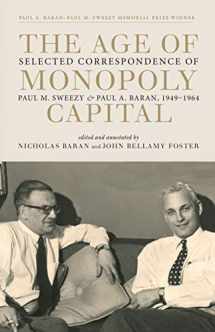
The Age of Monopoly Capital: Selected Correspondence of Paul M. Sweezy and Paul A. Baran, 1949-1964
ISBN-13:
9781583676523
ISBN-10:
158367652X
Author:
Paul A. Baran, Paul M. Sweezy, John Bellamy Foster, Nicholas Baran
Publication date:
2017
Publisher:
Monthly Review Press
Format:
Hardcover
544 pages
Category:
Economic History
,
Economics
FREE US shipping
Book details
ISBN-13:
9781583676523
ISBN-10:
158367652X
Author:
Paul A. Baran, Paul M. Sweezy, John Bellamy Foster, Nicholas Baran
Publication date:
2017
Publisher:
Monthly Review Press
Format:
Hardcover
544 pages
Category:
Economic History
,
Economics
Summary
The Age of Monopoly Capital: Selected Correspondence of Paul M. Sweezy and Paul A. Baran, 1949-1964 (ISBN-13: 9781583676523 and ISBN-10: 158367652X), written by authors
Paul A. Baran, Paul M. Sweezy, John Bellamy Foster, Nicholas Baran, was published by Monthly Review Press in 2017.
With an overall rating of 4.3 stars, it's a notable title among other
Economic History
(Economics) books. You can easily purchase or rent The Age of Monopoly Capital: Selected Correspondence of Paul M. Sweezy and Paul A. Baran, 1949-1964 (Hardcover) from BooksRun,
along with many other new and used
Economic History
books
and textbooks.
And, if you're looking to sell your copy, our current buyback offer is $0.3.
Description
The rich correspondence that preceded the publication of Monopoly Capital
Paul A. Baran and Paul M. Sweezy were two of the leading Marxist economists of the twentieth century. Their seminal work, Monopoly Capital: An Essay on the American Economic and Social Order, published in 1966, two years after Baran's death, was in many respects the culmination of fifteen years of correspondence between the two, from 1949 to 1964. During those years, Baran, a professor of economics at Stanford, and Sweezy, a former professor of economics at Harvard, then co-editing Monthly Review in New York City, were separated by three thousand miles. Their intellectual collaboration required that they write letters to one another frequently and, in the years closer to 1964, almost daily. Their surviving correspondence consists of some one thousand letters.
The letters selected for this volume illuminate not only the development of the political economy that was to form the basis of Monopoly Capital, but also the historical context—the McCarthy Era, the Cold War, the Cuban Missile Crisis—in which these thinkers were forced to struggle. Not since Marx and Engels carried on their epistolary correspondence has there has been a collection of letters offering such a detailed look at the making of a prescient critique of political economy—and at the historical conditions from which that critique was formed.
Paul A. Baran and Paul M. Sweezy were two of the leading Marxist economists of the twentieth century. Their seminal work, Monopoly Capital: An Essay on the American Economic and Social Order, published in 1966, two years after Baran's death, was in many respects the culmination of fifteen years of correspondence between the two, from 1949 to 1964. During those years, Baran, a professor of economics at Stanford, and Sweezy, a former professor of economics at Harvard, then co-editing Monthly Review in New York City, were separated by three thousand miles. Their intellectual collaboration required that they write letters to one another frequently and, in the years closer to 1964, almost daily. Their surviving correspondence consists of some one thousand letters.
The letters selected for this volume illuminate not only the development of the political economy that was to form the basis of Monopoly Capital, but also the historical context—the McCarthy Era, the Cold War, the Cuban Missile Crisis—in which these thinkers were forced to struggle. Not since Marx and Engels carried on their epistolary correspondence has there has been a collection of letters offering such a detailed look at the making of a prescient critique of political economy—and at the historical conditions from which that critique was formed.


We would LOVE it if you could help us and other readers by reviewing the book
Book review

Congratulations! We have received your book review.
{user}
{createdAt}
by {truncated_author}


